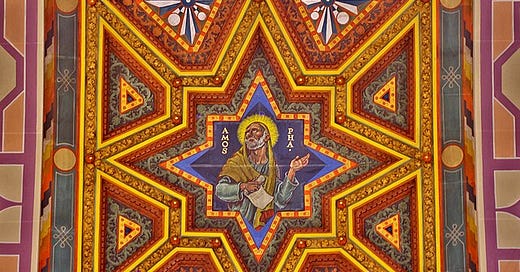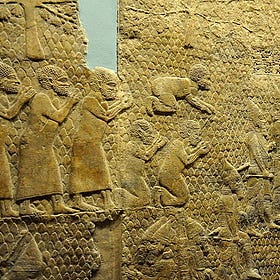Hello! Apologies if you had trouble accessing the Prayer Letter last time. This link will definitely get you there and help you to pray for the world in a more informed way. It’s a great resource so do have a look if you haven’t already.
If you’re anything like me, ministering on Remembrance Sunday might be accompanied by some trepidation. It’s an important day for lots of people, and it feels very high stakes. It’s also a time when you might see people you won’t meet at any other time of the year. It feels important to serve them by doing our ‘national church’ civic duty while making sure we offer something distinctly Christian. On top of all that, this year, we can help but think about the events in Israel and Gaza when we talk about war and many of us feel intimidated by the complexity of the history of the conflict and deeply grieved by the loss of life. So all of that adds up to a fairly anxiety-inducing combination of things…and yet, sermons must be written.
So let us muddle through together in amongst all of that complexity, letting the prophet Amos be our guide. Here are some suggestions for where this reading might take us on this remembrance Sunday.
Our Lady, Queen of the Most Holy Rosary Cathedral (Toledo, Ohio) - ceiling mural of the Prophet Amos, commons.wikimedia.org
Amos
Amos is an 8th century northern prophet who was writing when the Assyrian empire attacked and ultimately conquered the Northern kingdom of Israel. You can find more on that time period in a previous newsletter. The main thing to bear in mind is that it was very turbulent.
Isaiah, Micah and Friends
In last fortnight’s newsletter, we thought together about the Babylonian Exile and its retelling in the book of Chronicles. This week, we’re going to look at another significant exile event during which texts such as Micah and Amos were written, and which forms some of the background to our current morning prayer lectionary text: First Isaiah (chapters 1…
The set passage from Amos (5:18-24) begins with the voice of the prophet (vv18-20), then shifts to the voice of God (vv21-24). This is not unusual in prophetic texts that are made up of discrete oracles.
In v 18 we read about ‘the Day of the Lord/Day of Yahweh’. This theme appears elsewhere in the Hebrew Bible in places such as Isaiah 2, 13, Zephaniah 1, and the book of Joel.
The day of the Lord is an eschatological idea, meaning that it has a relationship to the apocalypse. We tend to associate apocalypse with the end of things, but the word literally means ‘unveiling’ in Greek. So, apocalypse in the Bible is more often about revelation of God’s power, rather than always relating to the end of things.
Going back to the historical context, eschatological or apocalyptic texts were often written during times of war. This is because conflict often made people feel like the world was coming to an end so texts written at this time reflect this sense of impending disaster. Amos is no exception. The Assyrian war and deportation formed the background of this text, and especially the desire in chapter 5 for ‘the day of the Lord’ to come.
The commentator Jorg Jeremias, whose commentary is available on google books, describes the way in which ‘for Amos’ contemporaries the “Day of Yahweh” was something to be desired, apparently the fulfilment of salvation in respite before all enemies and in a final, ultimate revelation of God’.1 Although this is part of how Amos understands the Day of the Lord, he also encourages his hearers to reconsider their desire that it come soon, asking them whether they are sure that they will not in fact be judged.
In the passage, judgment is made on the basis of the way in which the people pursue justice. God ‘hates’ (v 21) the festivals and offerings of the people. This is a fairly shocking statement, given the amount of the Hebrew Bible connected to the practicalities of ritual sacrifice and its importance. It is tempting, here, to suggest that the prophet Amos is suggesting that ritual doesn’t matter and justice should be the primary concern of the people. This is a line of argument that 20th century German biblical scholars used to denigrate Judaism, and should therefore be treated with caution.
As John Barton points out
‘an opposition to sacrifice is very striking in the ancient context. In later times, the Greek philosophical tradition came to regard sacrifice as unnecessary, but no ancient religion known to us was non-sacrifical in character’
So,
Prophets such as Amos ‘were not speaking against cultic ritual in principal, but rather wanted to introduce an order of priorities. Sacrifice is not unacceptable in itself, but is simply of a lower order of importance than social justice or heartfelt repentence’.2
You can access the rest of this chapter by John Barton on google books (see footnote), and it’s certainly worth a read.
What does this mean for remembrance?
It is a good way to emphasise the importance of sacrifice and justice. Amos is not saying that sacrifice is unimportant, and we are reminded of this as we reflect on the sacrifices of those who died in war.
Importantly, though, sacrifice is here held alongside justice and we are thankful for those who have laid down their lives in efforts to work for justice and peace. Times of conflict and fraught with problems and horrors, but for many the desire to join the armed services comes from a desire to work for the preservation of life. We can’t forget, though, the atrocities that result from war and the times in which loss of life has felt futile. For this reason, Remembrance Sunday remains complex for many.
Amongst all of this, Amos offers us a way to talk about ideas of sacrifice and justice, two themes that might inform our prayers for the world. This Sunday, we can ask with the prophet, that justice might ‘roll down like waters and righteousness like an ever-flowing stream’.
Jeremias, Jorg, The Book of Amos: A Commentary, (Louisville: Westminster John Knox Press, 1998), p 99; https://www.google.co.uk/books/edition/The_Book_of_Amos/3_hDCxtW5EMC?hl=en&gbpv=1&dq=the+book+of+amos:+a+commentary+j%C3%B6rg+jeremias&pg=PA19&printsec=frontcover
Barton, John, The Theology of the Book of Amos, (Cambridge: Cambridge University Press, 2012), pp 85-87; https://www.google.co.uk/books/edition/The_Theology_of_the_Book_of_Amos/LrEYKKOZAfwC?hl=en&gbpv=1&dq=amos+commentary+jeremias&printsec=frontcover





